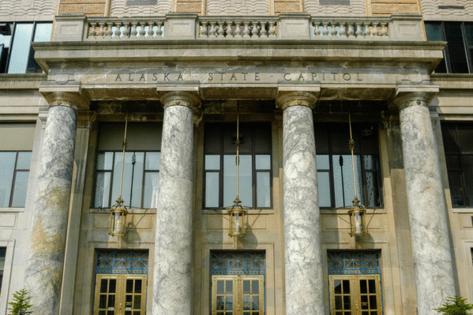Alaska Legislature poised to approve 'compromise' education bill with $700 per-student funding boost
Published in News & Features
The Alaska Legislature is poised to pass a compromise education measure on Monday with a $700 boost to the Base Student Allocation, the state's per-student funding formula.
Gov. Mike Dunleavy last week said that he would sign a school funding increase of that size, but only if education policies preferred by his administration were added to the measure. The Senate on Monday added several provisions intended to appeal to Dunleavy and minority Republican legislators.
A spokesperson for the governor's office did not immediately say Monday morning whether Dunleavy would support the amended measure.
Multiple lawmakers noted that the $700 increase to the BSA would be the largest nominal school funding increase in state history. But administrators in multiple school districts have said that may not be enough for a public education system in the midst of enacting steep cuts to programs, staff and more.
Republican minority members, in particular, have supported a funding increase, but only with policies intended to improve Alaska's bottom-of-the-nation test scores.
Anchorage Democratic Sen. Löki Tobin, chair of the Senate Education Committee, said the Legislature had made multiple attempts to get an education package signed into law. But she said the Senate's new education measure "strikes a balance" between policy and funding.
"While the bill before you isn't the final answer to adequately funding our schools, it will get the much-needed financial resources our schools desperately need to retain high-quality educators, reduce class sizes, keep beloved extracurricular activities and support our struggling students," she said.
The Senate on Monday approved HB 57 on a 19-1 vote. North Pole GOP Sen. Robert Myers was the only no vote.
HB 57 now heads back to the House for a final vote. Multiple lawmakers said the House could approve the bill later on Monday, sending it to Dunleavy's desk for his consideration.
But first, the Senate amended the measure on Monday to add "compromise" provisions.
House Bill 57 includes plans to limit cellphone use in schools; a boost for student transportation costs; provisions to ease the process of forming new charter schools and to make it harder for local school districts to revoke existing charters; provisions to establish target class sizes to limit overcrowding in classrooms; and the establishment of a legislative task force to study education funding and how to allow students to enroll in school districts other than the ones in which they reside.
The Senate on Monday added reading incentive grants proposed by Wasilla Republican Sen. Rob Yundt, a minority member, for reading. The $450 per-student funding would be paid to districts for their students who perform at grade level or show improvements in reading.
But the grants would only be paid if the Legislature approves Senate Bill 113 — a measure that would raise new state revenue by applying corporate income tax on out-of-state businesses that operate online.
Yundt said the grants would incentivize student outcome improvement. The contingency for new revenue recognized the tough fiscal spot the state faces, he said.
The measure advanced quickly last week for a final vote, setting the stage for last-minute negotiations.
Several minority amendments were rejected by the Democrat-dominated majority on Monday. But Wasilla GOP Sen. Mike Shower, the Senate minority leader, said the bill represented a "compromise" agreement with the minority after a lot of work over the weekend.
He said before Monday's final vote that he would support the bill with "a lot of reservations." He said that he could support the funding increase, but that the bill should have contained more education reforms. Shower suggested that his yes vote could change if Dunleavy vetoes the measure.
Minority Republican Sens. James Kaufman, Mike Cronk and Rob Yundt voted for the bill on Monday. If Dunleavy vetoes the bill, all three senators said they would vote to override Dunleavy's veto.
Dunleavy last week said that his policy priorities would need to be added for the bill to receive his support. Those policies included extra funding for homeschooled students on top of what they would receive through a BSA increase, reading incentive grants and plans to expand charter schools in Alaska.
But some of Dunleavy's education priorities have been opposed by many lawmakers. Multiple legislators have said that his open enrollment school policy could see students blocked from attending their own schools, and that his charter school provisions could erode the power of local school boards.
The Legislature last week failed to override Dunleavy's veto of another education bill that had a $1,000 increase in per-student funding. Overriding Dunleavy's veto required support from 40 of 60 legislators, or two-thirds of the Alaska Legislature. Last week's override vote failed with 33 lawmakers voting yes.
School administrators have said that a $1,000 BSA increase would be critical for school districts facing substantial deficits. Districts report that without a substantial funding increase, they will need to cut hundreds of teacher positions and popular programs.
But at a cost of over $250 million per year, many lawmakers have said a $1,000 BSA boost would be unaffordable with the state facing a dire fiscal outlook.
________
©2025 Anchorage Daily News. Visit at adn.com. Distributed by Tribune Content Agency, LLC.







Comments